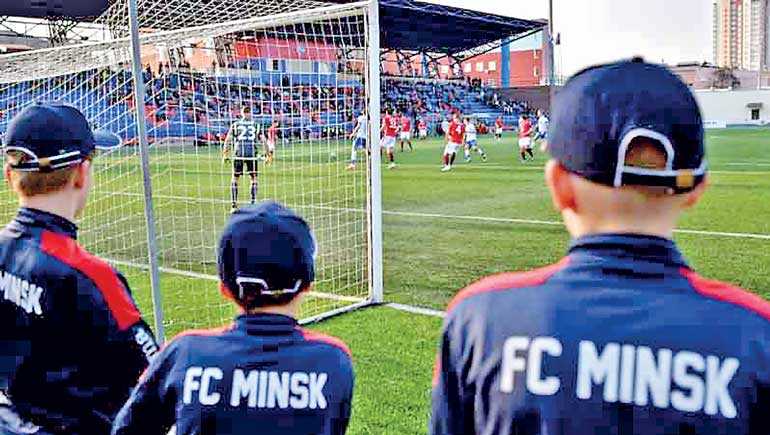Sunday Feb 22, 2026
Sunday Feb 22, 2026
Tuesday, 12 May 2020 00:49 - - {{hitsCtrl.values.hits}}

LONDON, AFP: Starved of sport during the coronavirus pandemic, bookmakers and punters have turned their attention to the football backwaters of Nicaragua and Belarus -- and they have proved an education for clients.
Sport in Europe has been particularly badly affected with the bookies’ two major sources of revenue -- major football leagues and horse racing -- suspended.
However, punters have taken to betting on such unlikely fare as Diriangen against Walter Ferretti in the Nicaraguan championship.
As one bookmaker put it, some may “giggle” at the thought but for others it has been a godsend.
Keith O’Loughlin, a senior figure at SG Digital which supplies sportsbook platforms and trading services to operators, says he has been encouraged by the figures he has seen across the globe.
“We have seen customers transferring in droves to alternative products,” O’Loughlin said on a videoconference at the Sports Betting Community digital conference last week.
“We have customers in each region - Asia Pacific, Europe and the USA.
“Customers in AsiaPac hold 70 to 80 percent previous levels of turnover, customers in Europe 30 to 50 percent and the US anything from 15 to 45 percent.” O’Loughlin puts this down to “people wanting to have a bit of fun” but at the same time bookies have acknowledged that they feel more reassured if it is educated fun.
To that end, several have embarked on enlightening their clients on the ins and outs of Nicaraguan and Belarus football -- two leagues that have continued to play through the crisis -- and the who’s who of table tennis.
“We launched through one of our web radio stations a daily talk show to entertain customers stuck at home,” said Fabio Schivaolin, CEO of Italian bookmakers Snaitech.
“It hosts talk about table tennis and the Nicaragua and Belarus championships to help give information to the clients to follow new markets and programmes.” O’Loughlin said table tennis had been a big winner with their customers’ clients.
“The customer never had it before but now it takes a chunk of turnover,” he said. “It is in some respects replacing tennis.
“The biggest bet in tennis is who wins the next point and so it is for table tennis.
“With the rise of live betting round the world people want a quick hit.”
Jamie Shea, head of Sports Book Digital with US operator DraftKings, says it has helped to educate punters about the sport.
“Table tennis clients have really embraced it and it is interesting to see silver linings,” said Shea, who has been in the business for over 25 years.
“There are a lot of new fans for non-traditional markets...Nicaraguan and Belarus football, table tennis. “A lot of people have used this time to really get to know who the players are.
“We have held a tutorial on how table tennis works as we found lots of tennis gamblers have moved there.
“I like it that there is a new fanbase for these sports including darts.” Matt Fowler, Director of Integrity at the International Betting Integrity Association (IBIA), has been astonished by the lure of table tennis.
“Table tennis being the highest volume product on a Saturday afternoon would have been ludicrous a few weeks ago,” he said.
William Woodhams, CEO of British operator Fitzdares, told AFP that while these niche markets had “made for some interesting press, in reality they haven’t made up at all in the loss of mainstream sport.” He also cautioned of the dangers of betting heavily on a league you don’t understand.
“I think watching the occasional football match fills a void but really it is not the same thing. Punters want to win and knowledge is how they beat us.
“You really wouldn’t want to bet a sizeable amount on teams where you can’t name a player.” Nevertheless, Fitzdares have used experts to both price up those markets and supply background in a daily email.
Before Dinamo Minsk played Neman Grodno in the Belarus league, their expert highlighted how the former had lost three of their first four games.
The expert hinted Dinamo’s poor form may be down to the fact that ultras are critics of Alexander Lukashenko, the authoritarian leader of Belarus.
“‘The league table doesn’t lie’ might genuinely not apply in Belarus, given the levels of propaganda at play!” noted the expert in a tongue-in-cheek comment.
The leagues’ moment in the sun may be shortlived though.
“They will dart back into the obscurity from where they emerged,” said Jason Scott of US operator Roar Digital.